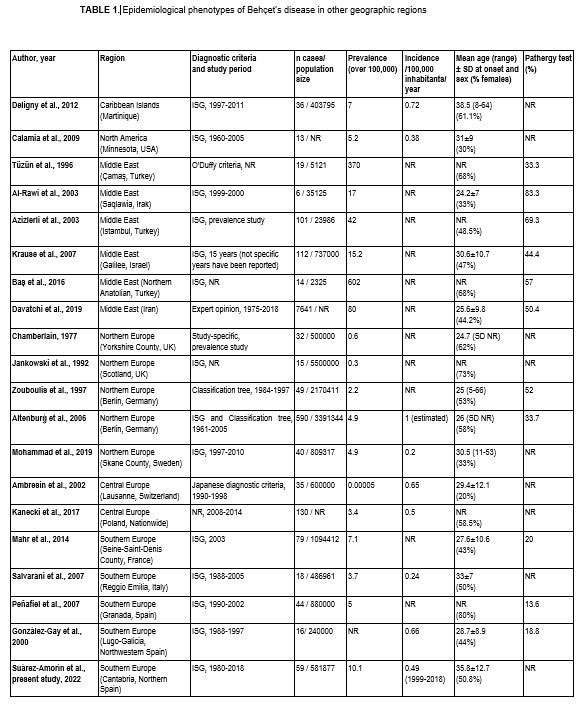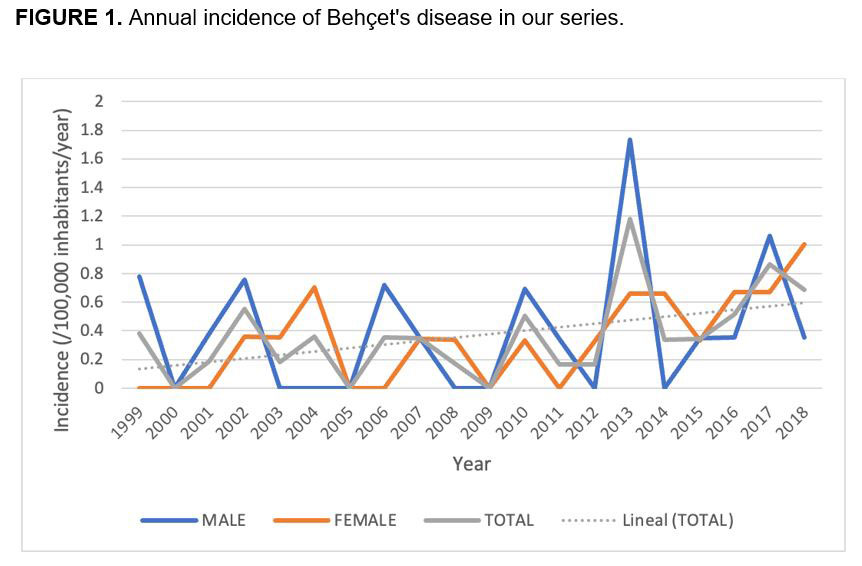Session Information
Session Type: Poster Session B
Session Time: 9:00AM-10:30AM
Background/Purpose: The prevalence of Behçet’s disease (BD) has a considerable geographical and temporal variability. Data regarding epidemiology in Spain are limited. Our study aimed to assess the epidemiology and clinical domains of BD in a population-based cohort from northern Spain and to compare the results with other geographical areas.
Methods: We conducted a cross-sectional study of a well-defined population in Northern Spain. Cases of suspected BD between January 1980 and December 2018 were identified. The diagnosis of BD was established according to the International Study Group (ISG) for Behçet’s Disease. The incidence of BD between 1999 and 2018 was estimated by sex, age, and year of diagnosis.
Results: Of 120 patients with probable BD, 59 patients met ISG criteria and were finally included in the study, with a male/female ratio of 0.97; mean age 49.7±14.7 years. Incidence during the period of study was 0.492 per 100,000 people, observing an increase from January 1999 to December 2018. Prevalence was 10.14 per 100,000 in 2018. Clinical manifestations were relapsing aphthous stomatitis (100%), genital ulcers (78%), skin involvement (84.7%), joint involvement (64.4%), uveitis (55.9%), central nervous system (16.9%), vascular (10.2%), and gastrointestinal manifestations (6.8%).
Conclusion: The prevalence of BD in Cantabria is higher than in other Southern-European countries. This difference may reflect a combination of geographic, genetic, or methodological variations, as well as the free accessibility to the Spanish Public Health System. Clinical phenotypes observed are similar to those described in other world regions.
To cite this abstract in AMA style:
Alvarez Reguera C, Suárez-Amorin g, Demetrio-Pablo R, fernández-ramón R, Herrero-Morant A, Sánchez-Bilbao L, Martínez-López D, Martín-Varillas J, Castañeda S, González-Gay M, Blanco R. Epidemiology of Behçet’s Disease in Northern Spain [abstract]. Arthritis Rheumatol. 2022; 74 (suppl 9). https://acrabstracts.org/abstract/epidemiology-of-behcets-disease-in-northern-spain/. Accessed .« Back to ACR Convergence 2022
ACR Meeting Abstracts - https://acrabstracts.org/abstract/epidemiology-of-behcets-disease-in-northern-spain/


